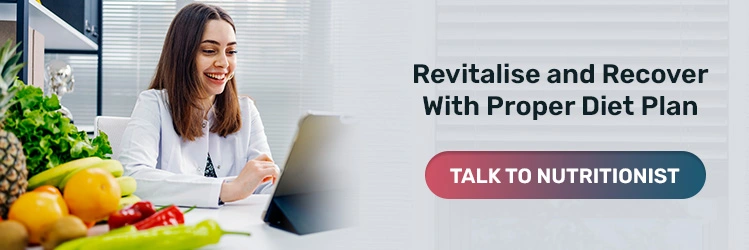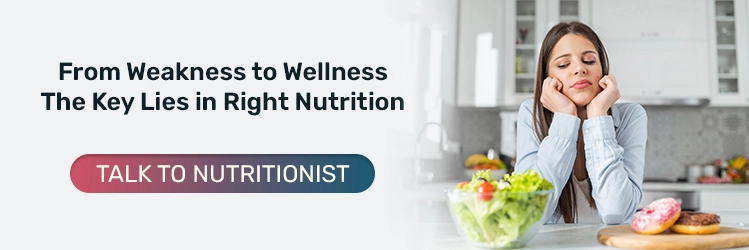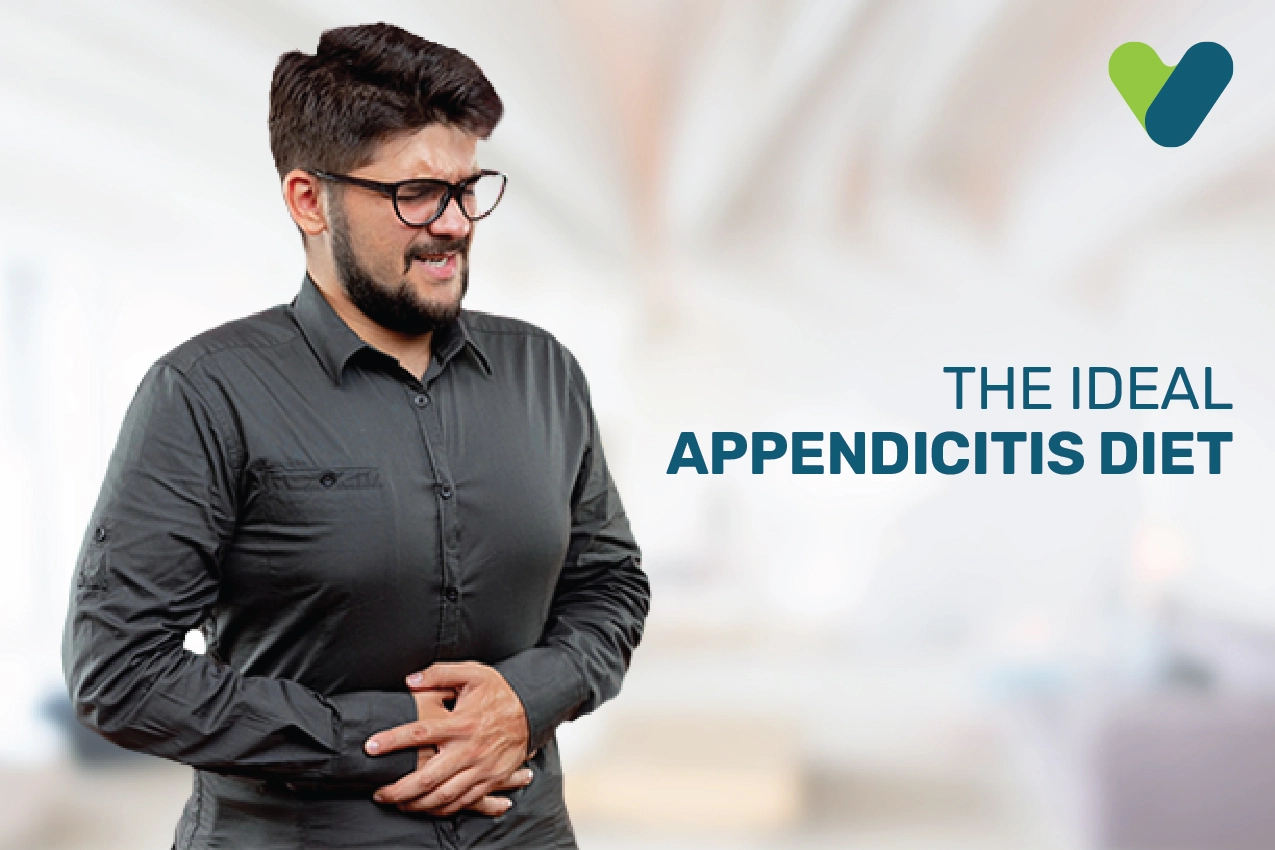An Overview of Appendix
The appendix is a vestigial organ shaped like a little finger, located on the right side of the belly. It is a part of our digestive system, even if it is a remnant of an organ. An obstruction in the appendix can cause appendicitis.How you can get appendicitis
Appendicitis is an inflammation of the appendix. In most cases, inflammation is caused by bacterial infections that cause blockages. Due to its broad spectrum of symptoms, like a low fever and belly button pain, it is not easy to identify. Most often, it will be treated with antibiotics or mistaken for a stomachache, gallbladder problems, urinary tract infection or gastritis. If ignored, appendicitis has the potential to be lethal. Your health will benefit from a nutritious appendicitis diet plan. Incorporate wholesome hi-fibrous foods in your diet to help you manage your appendicitis symptoms and lessen the discomfort.Foods to Eat During Appendicitis
- Vegetable juice: To lessen discomfort, consume the juice of vegetables including cucumber, beets, bottle gourds, and carrots. Vegetable juices are an excellent source of nutrients for your body. You can also combine spinach, radish, and coriander for quicker and more effective pain relief. Note: Do remember to perform taste checks on both sides of cucumbers and bottle gourds to prevent food poisoning. Do not consume a vegetable or fruit if they taste bitter, rancid, or odd.
- High-fibre appendicitis diet: Fresh fruits, boiled sprouts, oats, and other foods. Snacks like poha, dalia, and upma are wholesome and simple-to-digest options. Also, zinc-rich foods, such as dried fruits, and whole grains, help fight infection and boost the production of white blood cells.
- Ginger & turmeric: Ginger and turmeric are well-known for their therapeutic qualities. Their anti-inflammatory and detoxifying properties will boost your health and immunity. Take two servings of the ginger and turmeric mixture each day. Other appendicitis symptoms like edema, and nausea can also benefit from the diet.
- Fresh water and juices: Stay hydrated. Drink coconut water and fresh lemon and lime juices to boost digestion and immunity. Cranberry and pomegranate juices also detoxify and heal your body faster.
- Mint: Several appendicitis symptoms, such as nausea, vomiting, or gas, may be relieved by using this herb. Mint tea can be brewed by boiling mint leaves in water three times a day.
- Probiotics like buttermilk & yogurt: Dairy-free probiotics ease appendicitis symptoms. You can benefit from including sauerkraut, kefir, yogurt, buttermilk, and curds in your appendicitis diet every day. Curd rice can assist better digestion and general wellness.
Foods to Avoid During Appendicitis
Avoid eating these foods to prevent your appendicitis from getting worse. Ask your doctor for advice on what to eat and foods to avoid during an appendicitis attack and after surgery to help you recuperate faster. Everybody is unique, and your underlying medical issues can influence your dietary limits. Here is a list of appendicitis diet foods to avoid, as consuming the following foods might cause the appendix to rupture:- Fried foods: Fried, oily meals can be detrimental to your digestive system. Eat as little fried junk food as you can as fried food can worsen your appendicitis symptoms.
- Alcohol: Give up drinking. It's crucial for appendicitis patients to cut back on or stop drinking alcohol. It is essential to note that you may be medicated before, during and after your treatment or surgery. Consuming alcohol with medication can be counter-productive and you risk adverse reactions.
- Fatty foods: Some foods are difficult to digest. To change your general health, stay away from fatty meals, all kinds of meats. Also, rich, and heavy foods can worsen appendicitis.
- Sugar: Refined sugar is detrimental to your health and can worsen your appendicitis symptoms.

Appendicitis diet after surgery
- Morning cleanser: Lukewarm water with lime juice or wheatgrass juice in the morning on an empty stomach.
- Breakfast ideas: poha, upma or dalia, broth, herbal tea. You can have freshly squeezed vegetable juice on an empty stomach.
- Juices: White pumpkin, bottle gourd, cucumber, amla (Indian gooseberry), carrot
- Lunch ideas: Soup & steamed vegetables with gluten-free roti like bajra, nachni, rice. Rice or wheat-based dishes like idli, dosa, chillas etc. Add a probiotic like curds, sauerkraut, or yogurt.
- Afternoon: Fruit, handful of nuts & seeds, Steamed veggies with sauce or dressing of choice. Dinner: Fresh vegetable salad, sprouts, soup, or broth.
Table: Food for appendix patients to boost recovery after a medical procedure.
|
Recommended foods |
Appendix foods to avoid |
|
|
Must have |
Seasonal, local, and whole foods. |
All packaged foods. |
|
Juices |
Coconut water, carrot juice, beetroot juice, cucumber juice, herbal tea, green tea. |
Carbonated drinks & alcohol. |
|
Best fruits for appendix patient |
Bananas, apples, oranges, papaya, all melons, guava, amla, pineapple, apricots, plums, peaches, and all seasonal fruits. |
Packaged or canned fruits. |
|
Vegetables |
Green leafy vegetables like spinach, radish leaves, cabbage, squashes, beans, capsicum, all types of gourds, beetroot, and cucumber, beetroot, cucumber, potatoes, among others. |
Cruciferous vegetables for certain medical cases. |
|
Legumes |
All types of sprouts, chickpeas, green & yellow lentils, horse gram & green gram & beans. |
|
|
Grains |
Semolina upma, barley, oats or wheat porridge, unpolished red, brown & white rice. |
White flour, pastas & breads. |
|
Nuts, Seeds & dry fruits |
Dates, raisins, almonds, pumpkins & watermelon seeds, walnuts. Include a handful of nuts & seeds daily for natural oils. |
|
|
Spices |
Turmeric, fenugreek, ginger, coriander. |
Over consumption of salt & sugar. |
|
Oils |
Any filtered or cold-pressed oil. |
Minimise refined oil in foods. |
|
Note: |
|

